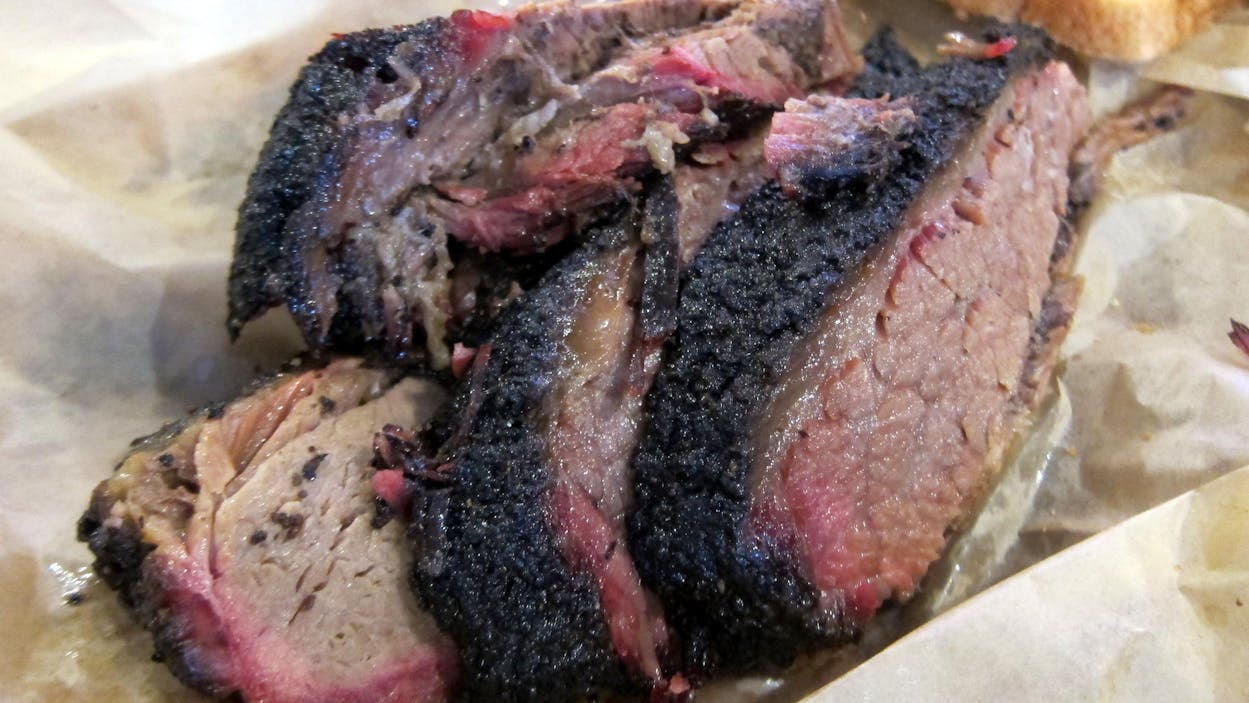Last week, what could be the most Texan of crimes took a tragic turn. Randall Lance Hughes, a 48-year-old man suspected of stealing $80 worth of brisket from an H-E-B in Waco, died of a gunshot wound after a standoff with police. Hughes allegedly pulled a knife on police and a store employee as he tried to make his getaway.
But that’s only the most recent Texas brisket heist. James Cordell Avery, or the “brisket bandit”, was accused of stealing more than $2,000 worth of brisket from 19 H-E-B stores (mostly in the Austin area) throughout 2014. Reports said Avery could be seen in surveillance footage pushing carts of as much as $900 worth of meat out of the store and into the parking lot where a getaway car would be waiting. For more on this, the Houston Chronicle profiled Avery, who had quite the rap sheet.
Daniel Vaughn, Texas Monthly‘s barbecue editor, had much to say on black market brisket, including our interest in the subject: “The more these stories get in the news, the more idiots get the idea,” he cautions. So if any copycats are out there reading this, know that H-E-B managers and authorities across the state are all the wiser now.
The Wall Street Journal and many others believe the heists sprung out of a spike in U.S. meat prices last summer. (You may have noticed signs outside of your local barbecue joint explaining higher prices.) A recent rise in cattle rustling might also be another indicator that beef market prices have been getting too high—more than $5.7 million-worth of cattle were reported stolen from Texas land in 2014, according to NBC DFW. Still, Vaughn isn’t as quick to make the connection between crime and cost spikes.
“Beef costs altogether have gone up entirely, but why aren’t people stealing whole bags of prime ribs?” he said. “I don’t know, maybe brisket is just the right shape to stow in your pants.”
We’ll explain: in 2011, several people were accused of stealing and smuggling briskets in their trousers. The stolen meat was then sold to several barbecue joints around Austin until police swooped in with a sting called—wait for it—Operation Meat Locker. And just so you know, “pants meat” (the technical term) is definitely a health code violation, and one that closed the three restaurants. Sam’s Barbecue and Willie’s Barbecue, two of the places shuttered after the bust, have since re-opened after reapplying for their permits. La Morenita, the third restaurant, unfortunately, did not survive.
Lifting uncooked meat—albeit extremely immoral—makes lucrative sense for the black market (until brisket special ops like the APD comes along). But there has also been a rise in the number of thefts right out of the smoker. Augie’s Barbed Wire Smokehouse, B&B Smokehouse, The Smoke Shack, and Two Bros BBQ Market in San Antonio have all experienced recent burglaries, according to the San Antonio Express-News. Now, what could the person who stole thirteen smoked briskets from Augie’s possibly do with all of that meat? Open a pop-up shop?
There’s a silver lining, however, to this inexplicable restaurant theft: local news air time. “It’s probably cheaper rates than traditional advertising methods,” Vaughn says. “[But] that’s certainly little consolation.”
In recent months, it appears that U.S. meat prices have begun stabilizing. And though you might be hoping for a lower price tag for your ‘cue fix, Vaughn wants barbecue restaurants keep their inflation prices.
“People are asking, ‘Why aren’t the barbecue joints lowering their prices yet?’” he says. “What they’re charging is more in line now with what they should be charging based on the cost of their raw product.”






